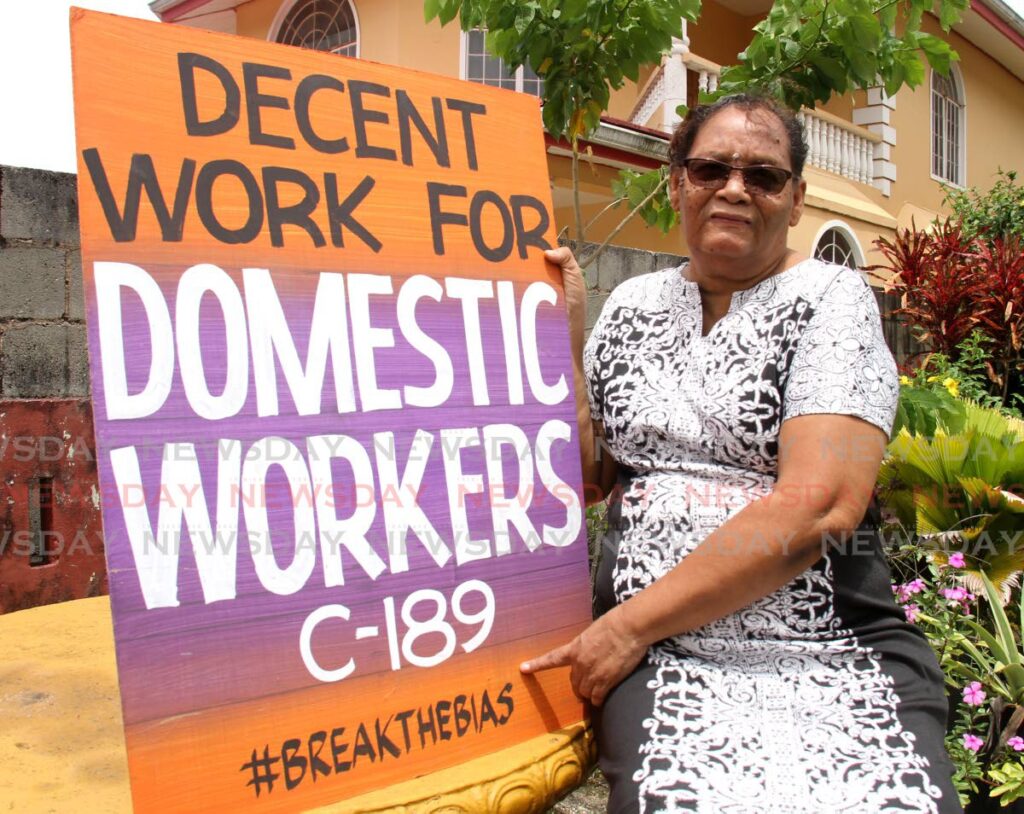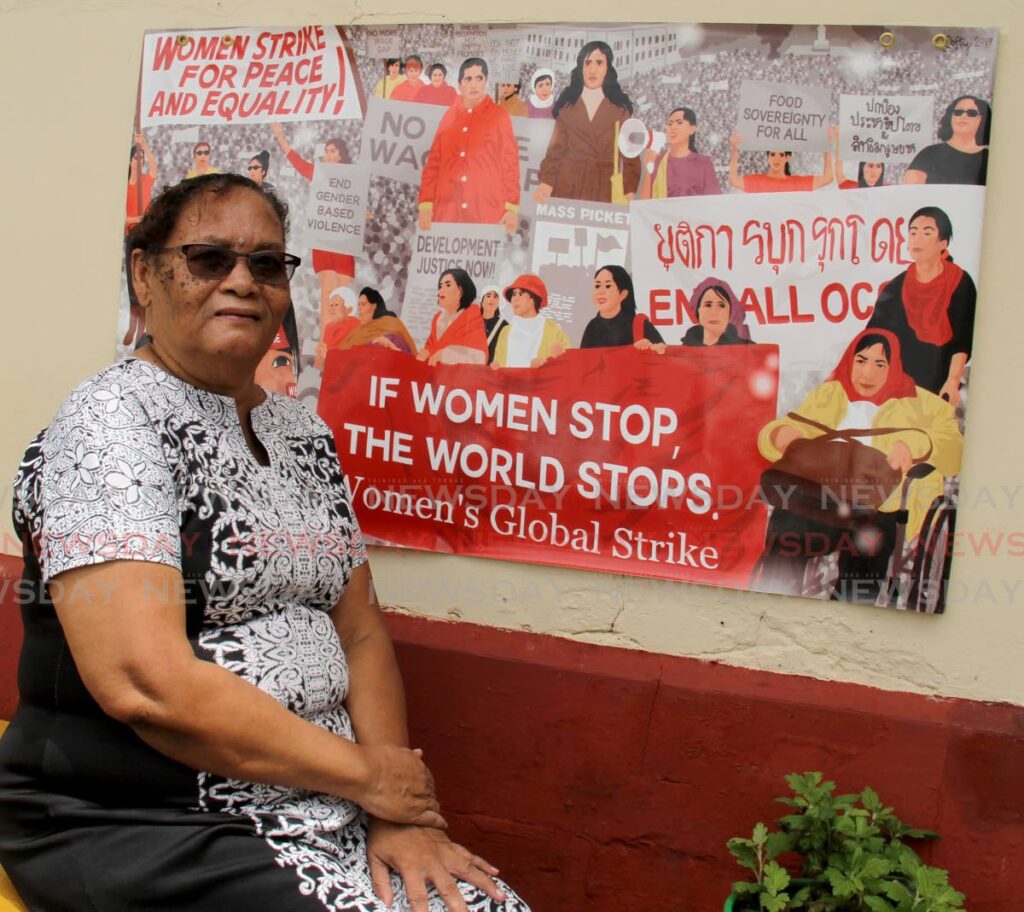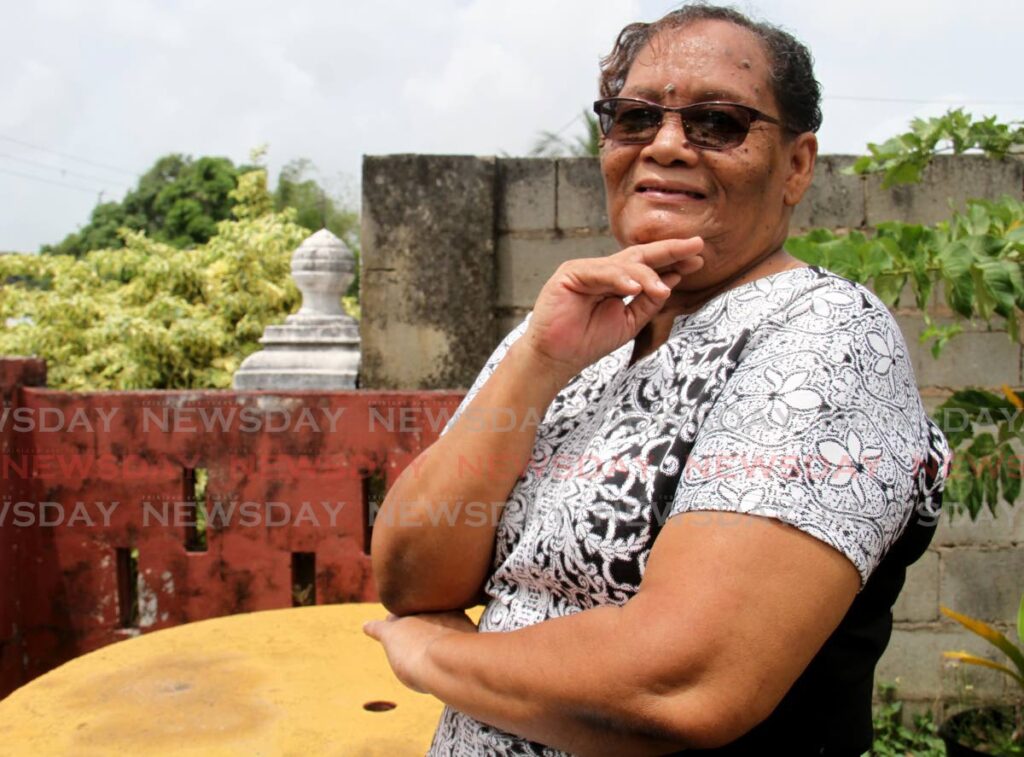Activist Ida Le Blanc 'never get weary yet' in struggle for domestic workers

TWENTY years of fighting for the rights of domestic and low-income workers in TT has taught Ida Le Blanc one valuable lesson – the struggle is never over.
And as evidence of her commitment to the cause, Le Blanc, general secretary of the National Union of Domestic Workers (NUDE), will be heading to Antigua on June 19 to attend a conference hosted by the International Union of Food, Agricultural, Hotel, Restaurant, Catering, Tobacco and Allied Workers’ Associations (IUF), of which NUDE is a member.
The IUF, headquartered in Geneva, Switzerland, is a federation of trade unions with members in various parts of the world, including the Caribbean.
The theme of the conference is, IUF Caribbean Defending Workers’ Rights in a Post-Pandemic World. It is being held at the Antigua Trades and Labour Union Hall from June 20-24.
Of the event, an excited Le Blanc told WMN, “We will be strategising with other trade unions from around the Caribbean on how we can move forward as a team as we learn from each other and to build power amongst us to face this new world of work that covid19 has forced us to live in where most of our terms and conditions of employment have been shifted or lost and our livelihood and hard-won gains taken away.”
She said while she regrets not being able to march with her trade union colleagues and workers at the Labour Day celebration, the Antigua conference would offer strategies for addressing the plight of domestic and low-income workers, post covid19.
“It is hard (being away from Labour Day celebrations) but it is necessary. It (Antigua conference) will be a way forward for us because there is a lot of work to do.”

As NUDE general secretary, Le Blanc, 66, has experienced first-hand the challenges confronting domestic workers in this country and the wider Caribbean.
She said the union’s office at Wattley Trace, Mt Pleasant, Arima, is usually overwhelmed with phone calls from distressed workers requesting assistance on a range of grievances, including unfair dismissals, maternity protection and violation of the minimum wage.
Many of the stories, she said, are heart-breaking.
“Domestic workers are still suffering daily in the workplace we call home.”
Increasingly, Le Blanc said domestic workers from within the migrant population are also reaching out to them for help.
She said, “Domestic workers coming from Caricom islands are reporting that the ‘Venes’ (Venezuelan migrants) are getting better treatment and the Guyanese are complaining that are treated like outcasts.”
Many workers have also complained about being forced to work six days a week for three days pay while overtime is paid in days off instead of cash, Le Blanc added.
“They cannot challenge the employers because they will be fired and they have to pay for their rent and/or furniture that they have taken out as hire purchase. They can also be deported.”
The daughter of the late social activist Clotil Walcott, who blazed a trail for Caribbean women in trade unionism, Le Blanc often heard harrowing tales of people, women in particular, being taken advantage of by their employers.
But as time wore on, she yearned to do more than just listen and empathise.
In 1982, at the age of 26, she was among an all-female executive registering NUDE with the Registrar of Trade Unions under the provisions of the Trade Unions Ordinance and the Trade Unions Regulations of TT.
The union’s main objective was to improve the terms and conditions of men and women working as household assistants, who, according to the Industrial Relations Act (IRA), are not considered as workers.
Le Blanc recalled she was not a strong member at the time but had assisted her mother in whatever way she could.
Walcott, who passed away on November 20, 2007 at the age of 82, was the president and founder of the union.
She said her mother taught her a lot about trade unionism and encouraged her to play an active role in the union.
Le Blanc recalled another staunch member of the union, whom she called Brother James Lynch, also saw her potential and encouraged her to learn typing to assist with the union’s administrative work.

“He would ask his grand-daughter to come to his office to teach me to type on an old type-writer he used. That was my mission on a Saturday and I did it to please my mother.”
Le Blanc said her interest in trade unionism grew when her mother became a member of the International Wages for House Work Campaign, which was based in the UK and run by a woman named Selma James.
She recalled around 1985, she received a call from an executive member of the union, asking if she wanted to come to Vienna, Austria, to attend a UN conference.
Shocked to have received the invitation, Le Blanc said she did not hesitate.
“I immediately said yes.”
The next morning, she said, a member of the union phoned her with the travel arrangements. Someone would have met her at the airport.
Le Blanc said the conference was an eye-opener.
“At the conference, I was so amazed to see all these women speaking out for their rights. I was amazed and wanted to be part of that movement.”
On her return to Trinidad, Le Blanc, enlightened by the experience, mobilised women in Arima and neighbouring communities to support a Counting Women’s Work event.
Counting Women's Work is an international research project dedicated to measuring the gendered economy, including unpaid care work.
“I heard the domestic workers and other low-income workers coming to Clotil about their problems in the workplace and I started to take an interest in the trade union side of things.”
By 1995, Le Blanc and her mother were off to Beijing, China, to fight for the recognition of unpaid work.
The trip coincided with the support the union received from then independent senator Diana Mahabir-Wyatt, who had tabled the legislation in the Upper House.
The mother of one lamented that although the Unrenumerated Work Act was passed in the Parliament, the government, to date, has not amended the IRA to include domestic workers as bonafide employees.
“Even though government has passed the Unremunerated Work Act, which implies that work in the home is work, they still do not recognise domestic work as work.”
Describing Walcott as “a fighter and great teacher,” Le Blanc recalled she often accompanied her mother to the Ministry of Labour and Industrial Court.
“I paid attention to how she conducted herself and told myself, ‘I can do it.’ Eventually, I was brave enough represent workers on my own.”
Eager to develop in the field, Le Blanc said she first enrolled in a ten-week course at the Cipriani Labour College, Valsayn, but felt it was not enough.
She then took the bold decision to leave her fledgling business in the hands of her daughter to start a two-year programme in labour studies.
The course required Le Blanc to fly out of the country frequently to attend seminars and conferences.
During that period, she saw an advertisement from Columbia University, New York, for people interested in advancing their skills in human rights activism.
Le Blanc was accepted into the seven-month course, which was paid for by the human rights advocate programme at the university.
She was among successful applicants from China, Republic of Congo, Uruguay, Ghana, Phillipines, Liberia, Mexico, Indonesia and TT.
“I will never forget those months and now I feel I should have taken on more learning.”
During her stint at Columbia University, Le Blanc spent one week in Washington DC visiting the headquarters of the International Monetary Fund.
She has also attended many human rights seminars in New York and other parts of the US, championing the cause of domestic workers.
Since then, Le Blanc continues to be a fierce defender of the rights of low-income workers, not just locally but around the world.
In April, she was awarded the Martine Anstett prize for her in advocacy. Anstett, who died several years ago, was a renowned human rights activist.
The prize is awarded every year on April 29 in Paris to an individual strongly committed to the defence of human rights and the rights of migrants.
Le Blanc is also serving a second term as a member of the steering committee for women and labour in the Economic, Social and Cultural Rights Network – a human rights group based in the US.
The network, which meets once a month to discuss the advancement of women in the world of work, has representation in Arabia, South America, South Africa and the US.
As TT celebrates the 85th anniversary of the Tubal Uriah "Buzz" Butler-led Oilfield Riots, which paved the way for Labour Day, Le Blanc called for the “launch of a new offensive to end shameful practices by unscrupulous employers.”
She claimed many of them continue to blatantly violate workers` rights.
Le Blanc also called on the government to honour its commitment to the Unremunerated Work Act, which acknowledges that housework is work.
“Therefore, workers who do this work should be acknowledged as workers.
She said NUDE also wants the International Labour Organisation (ILO) Convention 189 to be ratified so that domestic employees can enjoy decent work as other workers.
Le Blanc added this country must also fulfill its obligation to CEDAW (Committee on the Elimination of Discrimination Against Women) recommendation which, she claimed, states that the TT government must amend the IRA to include domestic workers as workers.
She believes the government’s two per cent wage offer for public sector workers for the period 2014-2021, which is currently being reviewed, will create more problems for domestic workers.
“They might end up being dismissed because they are already not recognised as workers under the IRA. So, NUDE would not be able to pick up their cases. That, in itself, is an indication of how domestic workers are treated.”
Although her work continues to be extremely fulfilling, the globe-trotting activist said it can also be a thankless job.
“In order to do this job, you must have love for people. As we struggle for justice for workers, it is a never-ending thing because women are still suffering in the workplace.”
She is happy, though, that more women in the labour force are now raising the voices against discriminatory practices and organising themselves within unions.
The Banking and General Workers Union in particular, she observed, has attracted many women to its fold.
Le Blanc applauded the work of Contractors and General Workers Union president, Ermine De Bique, whom she said, has been doing “a great job” in the position.
“I have watched her grow and she is a great example of women being given the opportunity to lead.”
Cassandra Tommy and Carla Walcott, general secretaries of the Amalgamated Workers Union and National Workers Union, respectively, also came in for high praise.
Still, Le Blanc noted the majority of women in the labour movement are yet to embrace leadership roles.
“It is usually the men and the excuse is always that women have to see about the children and do all of this housework. But men have to be more active in taking care of their families.”
Le Blanc said during her years as a NUDE executive, she has implemented public education and skills training programmes for domestic workers in several areas.
But she feels it is time to give others the chance to perform in the role of general secretary.
Le Blanc made it clear she is not leaving the union but is willing to function in an advisory capacity.
“I have dedicated my life to service because it is a work that I love. I have done it for the love of people, especially the grassroots women. But in doing so, I never really got time for myself.”

Comments
"Activist Ida Le Blanc ‘never get weary yet’ in struggle for domestic workers"